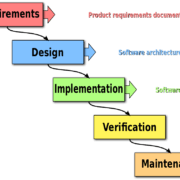B2B App Features Your Mobile App Needs
The high rate of internet connectivity combined with high rates of smartphone ownership have led to the adoption of mobile apps by businesses and consumers across different industries and sectors – retail, manufacturing, service, finance, and insurance.
B2B mobile apps have become indispensable in today’s fast-paced business environment for enterprises seeking to streamline business operations, improve performance and productivity. B2B apps cater to the evolving needs of enterprises, enabling efficient workflows, enhanced collaboration, and increased customer satisfaction.
However, the key to unlocking the full potential of a B2B app lies in its underlying features. A feature-rich application has immense capabilities to deliver value and streamline complicated processes or operations. From navigation, superior customer service, analytics, reporting, security, and seamless integrations, we look at different aspects that make a great B2B app.
USE OUR APP COST CALCULATOR TO ESTIMATE THE COST TO BUILD YOUR APP!
1. User Interface and Navigation
User interface and navigation are critical features that influence an app’s performance and adoption. A well-designed user experience and user interface are important in ensuring successful navigation by users.
A streamlined and visually appealing interface contributes to the intuitive design and enhanced user experience. For instance, research shows that 32% of your users will stop engaging with your website if it has a poor design. A well-designed website with clear layouts engages the readers, enhancing readability and retention.
Another component that contributes to the intuitive design and user experience is intuitive controls. Intuitive controls yield easy navigation, allowing site visitors to navigate the site seamlessly. According to documented statistics, 88% of site visitors will depart from a website after a poor customer experience.
2. Security and Authentication
Today, more than ever, organizations should be more secure in collecting, processing, presenting, and reporting data, especially consumer data. Poor security controls may compromise sensitive information leading to devastating financial, political, and reputational consequences.
Of special significance for any B2B app is protecting the security of sensitive information and personal data. The General Data Protection Regulation (GDPR) requires organizations to protect consumer data against unauthorized access. Enterprises violating consumer privacy regulations may face jail terms, fines, concessions, and possible termination.
So, your mobile app must accommodate the emerging needs of consumers without compromising their information or privacy. Most importantly, your B2B app must consolidate consumer information and integrate the appropriate safeguards against cyberattacks.
Some ways to create secure and authentic apps include:
Creating secure mobile apps requires the technical knowledge of attack vectors and the emerging sophistication of cyber-attacks. Use the following best practices to develop authentic and highly secure B2B mobile applications:
- Secure login methods. Leverage two-factor authentication (2FA) or Multi-Factor Authentication (MFA) to add a layer of security to your devices, accounts, or networks. A 2FA or MFA requires additional verification to access a secured account or system. For instance, you may need to input your password and a code sent to your phone to access an email with a two-factor authentication.
- Strong encryption. Strong encryption algorithms such as SSL and TLS protect against unauthorized access to stored or in-transit data. So, whether you’re sharing fiscal information with your stakeholders or storing your customer information in a CRM database, strong encryption will protect your sensitive information, whether transmitted over large networks or at rest.
- Role-based access control. Role-based access control provides access privileges based on roles and responsibilities. For instance, if you’re the head of finance, you’ll access devices, systems, and networks with financial information and not any other network. Your roles will define your access privileges and permissions.
A secure app ensures trust and confidentiality, driving brand loyalty and customer retention.
3. Integration
A B2B app must seamlessly integrate with all the other applications used by a business. For instance, if you have enterprise resource planning (ERP) applications, your mobile app must seamlessly integrate, exchange information, and communicate with the ERP suite.
The same case applies to your procurement automation software. Your mobile app must communicate with your procurement software to maximize efficiency and productivity. The ability to communicate and integrate seamlessly with other business apps ensures B2B mobile apps can optimize the existing infrastructure and workflows. Seamless integration with ERP, CRM, project management, and other industry-specific applications ensures maximum performance and productivity.
An important part of integration is integration with cloud services for easy accessibility and data backup. Cloud-based services, whether on-premise or outsourced, provide a safety net in case of hardware failures or storage issues, ensuring disaster recovery and business continuity during attack.
4. Communication and Collaboration
Perhaps one of the most overlooked features of a B2B mobile app is communication and collaboration. Mobile apps must ensure effective communication, information exchange, and collaboration.
Business owners use mobile apps to understand consumer purchase habits, client preferences, and customers’ shared values. On the other hand, customers use mobile apps to identify unique value proportions, pricing structure and evaluate competitive advantages. Customers use the app to assess and evaluate their purchase decisions.
The key components of collaboration and communication in mobile apps:
- Document storage and sharing. The B2B app should ensure that users can securely download, store, and share files and other resources within the app’s ecosystem.
- Version control. Version control tracks documents, allowing different team members to work on a single document while tracking changes. It allows different users to collaborate on a single document while maintaining a clear audit trail.
- Task management. Workflow automation helps with task management because tasks can be scheduled to occur in given scenarios. The automation of repetitive tasks improves efficiency and reduces manual efforts. The B2B app should be able to automate task assignments, approval workflows, and notifications, thus minimizing delays and ensuring seamless progress.
A B2B app becomes a central hub for efficient communication and profitable collaboration by providing robust communication and collaboration features.
5. Analytics and Reporting
Analytics and reporting capabilities help businesses obtain invaluable insights and information like customer feedback, track performance, and make data-driven decisions. Analytics provide the business with a clear picture of the market and industry.
Analytics and reporting capabilities provide customer purchase trends, changing perception, product positioning, and brand positioning, allowing organizations to make actionable decisions. Analytics save organizations resources by allowing them to predict problems and their solutions.
The main components of analytics and reporting include:
- Data visualization. The B2B app must have data visualization boards to present information in a visually-appealing manner. The B2B app must provide data visualization components such as graphs and charts that present complex information simply and clearly.
- Customizable dashboards. The B2B mobile app must provide customizable dashboards for real-time insights. Customization helps users to personalize their data views and helps them to monitor important metrics in real time.
- Generation of reports. The B2B app must be able to generate reports of key performance and industry metrics. The app must crunch the data and provide detailed reports that highlight the key trends for decision-making.
- Data exports. The B2B must allow users to export data in Excel, Word, CSV, and other formats to do an in-depth analysis with other tools or share with other stakeholders. Data exports enhance the accessibility and sharing of data, improving its usability and application.
B2B apps must analyze trends and communicate emerging trajectories with accuracy. This way, organizations can adjust their systems, resources, and networks to respond to evolving market and industry changes.
6. Predictive Maintenance
Beyond data visualization lies data mining for advanced analysis. Your B2B app can have advanced analytic techniques to read and analyze AI, ML, and natural language processing (NLP) with ease. The app can be designed with predictive analytics capabilities to identify trends and propose the best actions. In addition, data analytics can provide intelligent recommendations based on historical data and user behavior.
7. Customer Support
The evolving nature of customer service demands organizations to be more proactive in resolving issues. Today, B2B mobile apps bridge the gap between efficient communication and poor feedback, allowing organizations to be more agile in their outreach and customer communications.
Any successful B2B mobile app must provide efficient communication and gather feedback. By integrating robust customer support features, B2B mobile apps can detect issues, address issues, and ensure continuous improvement.
These are the main components of superior customer service in B2B apps.
- Ticket creation and tracking. Every B2B app must create, initiate, schedule, and track tickets seamlessly. The app must offer a helpdesk or ticketing system that allows users to create support tickets for any issues they face.
- Customer feedback collection. Customer feedback collection and analysis is indispensable in any superior customer service. Organizations that provide excellent customer service understand their customers’ sentiments better. The B2B app must offer a mechanism for users to report issues and express disgruntlement.
- Ratings and reviews. In addition, allowing users to rate and review app features allows B2B apps to understand their performance. Ratings help with continuous improvement because organizations prioritize improvements based on customer feedback.
Customer support is an indispensable part of customer attraction and retention; apps with superior customer support features enjoy better visibility and usability than those without.
8. Offline Data Security and Backup
Offline data security and backup are emerging trends in mobile app development. Today, apps with cloud-based accessibility are in more demand as organizations and employers seek to encourage more remote workforces. The emergence of cloud computing as a model for remote data storage, transmission, and processing, allows mobile apps to secure user data, regardless of location or size.
It’s important to note that specific components facilitate offline data security and backup.
- Encryption of offline data. Offline data security involves encrypting offline data to ensure it cannot be read or accessed by unauthorized third parties.
- Data back-up. Data backup ensures business continuity by providing critical operational data during a breach or incident attack. B2B apps use automated data back-up to ensure seamless collection of information.
- Secure cloud storage. The B2B app provides secure cloud storage for offline data backups, protecting offline data against unauthorized access.
Data security is a critical component of any business, ensuring that organizations adhere to the principles of data integrity, confidentiality, privacy, and accountability.
SCHEDULE A CONSULTATION WITH AN APP DEVELOPMENT EXPERT TO GET A CUSTOMIZED QUOTE!
9. Scalability and Performance Optimization
Scalability is an important factor for any B2B mobile app. The ability to scale up and down depending on changes in operational demands is a critical component of B2B applications. Your mobile app must handle excessive traffic. It must be able to process a growing list of requests and provide efficient feedback and resolution.
To do this, it must be designed with scalability in mind. Expert developers use cloud offline storage capabilities to improve the scalability of their applications in case of excessive traffic or loads.
Here’s what you need to create a scalable mobile app architecture.
- Your app must handle increasing user loads and data volumes.
- Scalable architecture that supports a high user reoccurrence.
- Efficient database optimization for faster response time.
- Caching mechanism to reduce server load.
Scalable B2B apps can accommodate changes in user requests, ensuring efficient load and data processing and faster response times.
10. Multi-language and Localization
Multi-language and localization support refers to your app’s ability to provide more than one language for your users. For instance, if you’re in the United States, you may be tempted to create an app for English speakers. However, when venturing into foreign markets, you may be forced to include multi-language capabilities and location support in your app.
Multi-language and location support provide numerous benefits. First, it’s easy to switch between different languages in the app. The location of labels and texts suits audiences in different regions. Localization must take care of dates, time zones, and regional differences. Localization ensures that you communicate with clients regardless of their geographical differences.
NS804 – Building Robust and Scalable Mobile Apps
Whether you’re a small business or a large enterprise, a B2B mobile app empowers you to do more with less. Your mobile app can be optimized to communicate with customers, collect analytics, and report sensitive activities. In addition, the B2B app can be optimized to provide automated reporting of issues through predictive maintenance.
And if you have offices inside or across the country, you can always rely on your app to provide accurate and timely reporting, whether dealing with employee performance or experiencing order delays. Your B2B app must incorporate powerful features that allow you to solve emerging problems. For instance, your app must completely secure user information and sensitive data.
Partnering with a B2B mobile app specialist enables you to optimize their market knowledge of different products and industry expertise of the best practices. NS804 works with experts and professional programmers with a vast understanding of new trends. And with our minimum viable product MVP option, you can seek a replica version before you develop the end product.
Contact NS804 if you’re searching for a B2B mobile app specialist.

 https://unsplash.com/photos/F0e3AdcwVbM
https://unsplash.com/photos/F0e3AdcwVbM









 https://www.pexels.com/photo/blue-and-white-logo-guessing-game-5444435/
https://www.pexels.com/photo/blue-and-white-logo-guessing-game-5444435/
Leave a Reply
Want to join the discussion?Feel free to contribute!